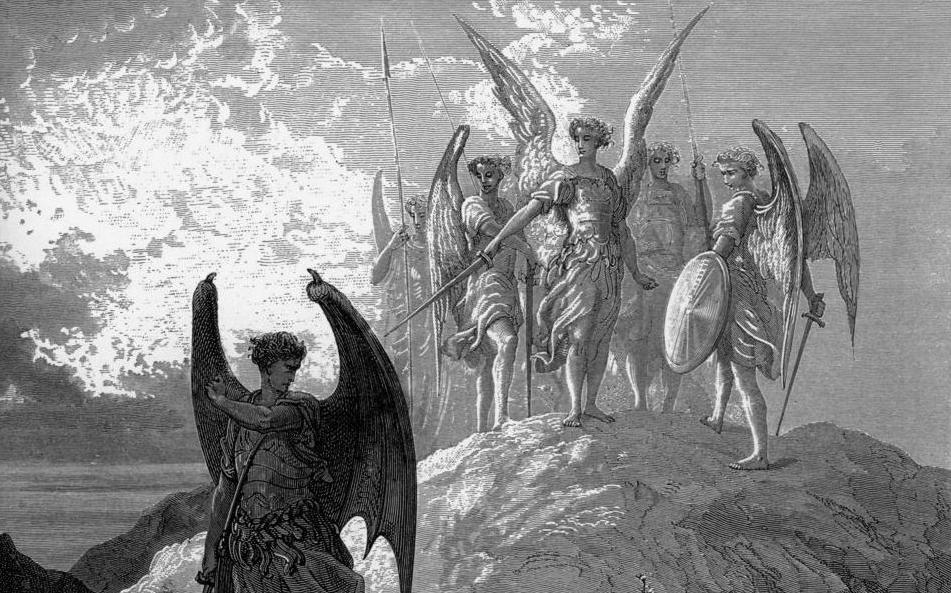I’ve been rereading Milton’s Paradise Lost. I am not alone in this; earlier this year, every time I checked Twitter, someone was commenting on Paradise Lost. There seemed to be a gravitational pull toward Milton’s epic. Many people, from Jaspreet Singh Boparai at The Critic to Ed Simon at LitHub, found themselves commenting on this very old poem—and not just the poem, but the concepts of good and evil, the nation, and the very possibility of virtue in a world like ours.
This is not a coincidence. We are living through a strange time. It is not unprecedented, despite the insistence of countless recent writers to the contrary, but it is undeniably very strange. It is a time in which a father is using his son’s blood to chase immortality; nations create elaborate bureaucracies to eliminate individuals seen as less worthy; and online personalities singing unequivocal praises of the Greek Dark Ages attract tens of thousands of followers. In this time, in which humanity seems to exist in thrall to claims of youth, strength, and power, Milton’s strange poem is newly attractive and newly disturbing in equal parts. That, I believe, is no accident.
Milton’s poem has always been disturbing, and for one primary reason: his Satan. The Satan of Paradise Lost is a staggering invention. Far from the brutal, subrational tortured behemoth of Dante, Milton’s Satan is oddly appealing. He’s manly, assertive, creative. He’s compelling. He has a goal and he pursues it relentlessly. He refuses to submit to fate. He’s a powerful speaker and a visionary.
In a word, he’s heroic.
To read the first half of Paradise Lost is to find oneself admiring the Devil, and that is a disturbing place to be. It is so disturbing, in fact, that many readers claim that Milton has made a misstep somehow. William Blake wrote that Milton had to be “of the Devil’s party without knowing it.” John Dryden, who believed that Milton had made Satan the hero of Paradise Lost, rewrote the poem in rhymed verse and “corrected” what he saw as Milton’s imaginative error; for decades, his translation was far more popular that Milton’s original.
In rereading the poem, I understand where Blake and Dryden are coming from. Milton manages to bring Satan very near our hearts in the poem; he speaks, as it were, to our longings and comports himself in the way we imagine a hero would.
This bothers people. It bothers me. I do not like that I admire the Devil for exemplifying certain virtues. If the courage, creativity, and indomitability we see in Milton’s Satan came from a character with any other name, I would find myself praising him.
The question becomes: Is this an imaginative failure on the part of the artist? Does Milton stumble here, lured by some darkness in his own vision into loading the Prince of Darkness with virtues? Or does he load his Devil with attractions intentionally, drawing us into this sympathetic relationship with darkness for some moral purpose of his own?
Types of Devils
Before we can answer that question, we must understand Milton’s Satan in its place in the tradition of Christian conceptions of the Devil. Leaving aside the medieval idea of the Devil as a fork-tailed, pitchfork-wielding monster whose toothy grin mocks fallen souls (an idea that may, for all I know, be the most accurate one we have), I want to look at the two other defining depictions of Satan in the contemporary Western imagination: Dante’s and C.S. Lewis’.
I will begin with Lewis’ because it is easiest for me to accept. Lewis is an Augustinian of the first order; he believes absolutely that evil is the negative of Good, and he demonstrates this in his writing by making evil always small, petty, gray, dull. Even his fiercest evils, like Tash in The Last Battle and the devils of That Hideous Strength, are shown to be pale, flaccid, and tasteless in comparison with goodness. In the comic essay “Screwtape Proposes a Toast,” Lewis shows Hell as a nasty little place, and its bureaucracy consumed with petty details, squabbling over minute differences in the diabolic hierarchy.
In teasing out his Augustinian convictions to this degree, Lewis is following a thread plucked from Dante, whose Devil (“Emperor of the kingdom dolorous”) is bestial and gibbering. By having abandoned God, Dante asserts, the Devil has lost not only his own reflected beauty but even his mind. Virgil explains to Dante that the intellect is the light of God in the mind; by this reasoning, Hell includes the loss of intellect, language, and coherent thought. When we meet Satan at last at the end of the Inferno, this is exactly what we see: a being that has lost all intellect.
This is a poetic flourish on Dante’s part, a play on the Scholastic notion of angelic beings as pure intellect. The Scholastics incorporate scriptural imagery to understand what this pure intellect is like: swift, constantly in motion, full of eyes, irradiated with light. These symbols—motion and vision—are motifs throughout Western literature to indicate proximity to the Divine. Plato’s Socrates says in the Phaedrus that the life of the soul is motion; he defines “the soul” as “that which can move itself.” Both Plato and Aristotle connect transcendent reality with light and vision; from Plato’s allegory of the cave (wisdom as seeing) to Aristotle’s idea of eudaimonia as contemplation—or true seeing—of the Good, Western thought connects the intellect, vision, and motion at a deep, intuitive level. Importantly, it places God outside this interaction; whereas God is the perfect union of intellect and will, the brilliant Light all vision sees, He is not motion. From Aristotle through to the Scholastics, God is the Unmoved Mover; He brings about motion, but He himself is not moved.
Dante’s Satan is immobile, trapped in the dark ice that is the frozen heart of Hell. He is both sightless (due to the darkness) and fixed. The physical description Dante provides is a metaphor for the spiritual condition of Satan: the condition of having lost both light and motion, the two concepts that illustrate for us the idea of intellect. He has, in an ironic twist, achieved his wish: he, like God, does not move. But for him, whose nature is that of pure intellect, this immovability is eternal torment.
Milton’s Satan crashed through this Augustinian backdrop like lightning. His Satan is active, clever, bold. He is not stymied by God’s victory over him but immediately rallies his forces and begins working against the Heavenly Kingdom by whatever means he can. He plucks his fallen comrades from the burning lakes and sets them to work—creative, inspiring work, raising palaces of gold and jewels from the smoking plains of Hell. He is not daunted by being overthrown by the Eternal One.
In contrast, Milton’s God falls a little flat. While Satan busily sets about launching a vast campaign against God and strategizes to attack mankind as the weak point in God’s armor, God seems to resign Himself to His fate. Coming after the Council in Hell, the great council in Heaven, in which the Father explains to the Celestial Hierarchy just what is at stake should mankind fall, feels like an anticlimax: Why does the all-powerful God simply allow things to take their course? In the face of this divine complacence, the scrappy, desperate Devil strikes us as positively splendid.
How could a poet as perceptive as Milton make such a glaring mistake?
A Divine Misdirection
Of the three views I have in mind today—Dante’s, Milton’s, and Lewis’—Lewis’ is by far the easiest for me to accept. The reason for this, I believe, provides a clue as to why Milton wrote his Devil the way he did.
Lewis’ Satan is exactly the way I want him to be. I want the Devil to be small, petty, bureaucratic—gray and miserable. I want him to be icky and unappealing. I want to believe that my own imaginative instincts, which I have deliberately tried to cultivate toward virtue, would recoil from evil. I want to think that nothing about Satan would appear beautiful to me and that nothing in Hell would remind me of my own soul.
Dante, despite the increased grandeur of his vision, allows me to persist in this delusion. His Hell is entirely vile, his devils disgusting, his Satan repulsive and bestial. But Milton—ah, Milton! with his heavy Puritan heart—Milton will not leave us happy in our faults.
Percy Bysshe Shelley wrote that “Milton’s Devil as a moral being is far superior to his God.” In the centuries since Milton wrote his great poem, his Satan has, perhaps contrary to his own expectations, routed our imaginations. But Milton, by his own words, did not intend for Paradise Lost to be universally popular. He hoped, he wrote, that it would “fit audience find, though few.” This may have been authorial false humility, but it does seem clear that he expected his poem to be misinterpreted, or at least under-interpreted. This has indeed been the case; the epic’s secrets continue to be revealed, as when a college student discovered a hidden acrostic in the poem as recently as 2018.
So perhaps the tug of Satan on our imaginations is not contrary to Milton’s expectations. Perhaps Milton knew exactly what he was doing in creating a Satan that so neatly filled out the silhouette of a classic heroic type. I believe that in shaping his Satan the way he did, Milton did not accidentally ally virtue to devilry; instead, he exposed the devilry that lies at the heart of many contemporary “virtues”: the virtues of independence, of willfulness, of creativity unmoored from telos. The indomitability of his Satan is not a misstep but a warning not to be seduced by seemingly heroic independence. The golden towers of his Hell are no mistake but a reminder (for Milton was very wary of usury and interest-based economic systems) that wealth is a barrier to Paradise.
Lewis, of course, knew this. Even though his Satan looks very different from Milton’s, they wander the same spiritual terrain: that of Pride. Lewis wrote in Mere Christianity: “According to Christian teachers, the essential vice, the utmost evil, is Pride. Unchastity, anger, greed, drunkenness, and all that, are mere flea bites in comparison: it was through Pride that the devil became the devil: Pride leads to every other vice: it is the complete anti-God state of mind.”
When we read Paradise Lost and find ourselves impressed by Satan, that is what we are impressed by: his pride. When we are unimpressed by God the Father and God the Son at the Heavenly Council, we are unimpressed by the Divine humility, which not only creates but submits to the choices of His creation.
Milton accomplished more in his epic than merely a retelling of the falls of Satan and of Adam; rather, he created an imaginative space in which every reader reenacts those falls. Every reader, by being moved by the Devil’s pride, rebuilds Hell in his own heart. And every reader, by remaining unmoved in the face God’s humility in awaiting Adam and Eve’s choice, crucifies Christ anew. When we find ourselves cheering for Milton’s Satan, it reveals not a failing in Milton’s depiction of the Devil but a failing in our own souls.
Paradise Lost could be a parable for our strange days: when devilry goes hand in hand with almost god-like technological achievement, when the highest-ever standard of living accompanies skyrocketing suicide rates, and when nations stockpile unbelievable wealth while strategically eliminating the vulnerable. It is well worth our time to return to this startling epic because it has the ability to prepare us to discern what comes from the humble heart of God, and what is marked—however splendidly—with the sign of the Devil.

